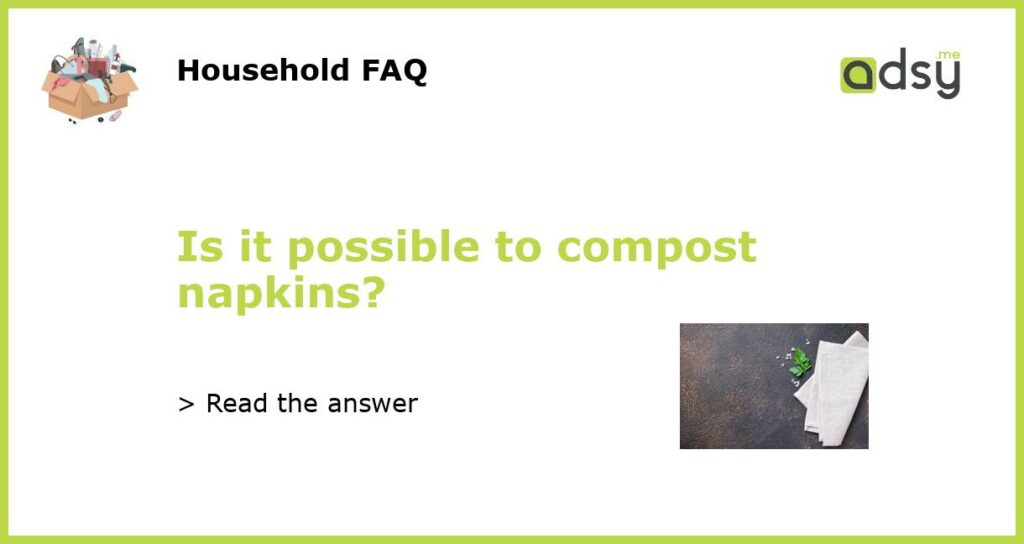Yes, it is possible to compost napkins
Napkins are commonly used in households and restaurants for wiping hands and cleaning up spills. As concern for the environment grows, many people are wondering if it is possible to compost napkins. Composting is the process of breaking down organic matter into nutrient-rich soil. In this article, we will explore whether napkins can be composted and provide some tips for composting them effectively.
What type of napkins can be composted?
The type of napkin you are using will determine whether or not it can be composted. While most paper napkins are compostable, it is important to check the packaging or contact the manufacturer to make sure. Some paper napkins are treated with chemicals or dyes that may hinder the composting process. Look for napkins that are labeled as compostable or made from recycled paper.
On the other hand, cloth napkins are also a great option for composting. Cloth napkins are reusable and can be composted at the end of their life cycle. They are generally made from natural fibers like cotton or linen, which are biodegradable and will break down in a composting environment.
How to compost napkins effectively?
Composting napkins is relatively easy, but there are a few things to keep in mind to ensure they break down properly:
- Remove any contaminants: Before composting your napkins, make sure to remove any food or liquid residues. These contaminants can attract pests or slow down the composting process.
- Tear or shred the napkins: Tearing or shredding the napkins into smaller pieces will help them break down more quickly in the compost pile. This is especially important for cloth napkins, as they may take longer to decompose compared to paper napkins.
- Balance carbon and nitrogen: Composting requires a good balance of carbon-rich (browns) and nitrogen-rich (greens) materials. Napkins are considered carbon-rich materials and should be balanced with nitrogen-rich materials like fruit and vegetable scraps or grass clippings.
- Aerate the compost pile: Regularly turning or aerating the compost pile will help accelerate the decomposition process. This allows oxygen to reach the microorganisms that break down organic matter, including the napkins.
- Monitor moisture levels: Compost piles should be kept moist but not too wet. If the pile is too dry, the decomposition process will slow down. If it is too wet, it may become anaerobic and produce unpleasant odors. Maintain a moisture level similar to a damp sponge.
Benefits of composting napkins
Composting napkins offers several benefits:
- Reduces waste: By composting napkins, you are diverting them from landfill, reducing the amount of waste that ends up in the environment.
- Creates nutrient-rich soil: Composting napkins allows them to break down into nutrient-rich soil that can be used to enrich garden beds, potted plants, or lawns.
- Helps fight climate change: When organic waste like napkins decomposes in a landfill, it produces methane gas, which is a potent greenhouse gas. Composting instead helps to reduce methane emissions and mitigate climate change.
- Closes the nutrient loop: Composting napkins returns nutrients back to the soil, completing the nutrient cycle and supporting a healthy ecosystem.
- Promotes sustainable practices: Composting napkins is an example of sustainable waste management, demonstrating a commitment to reducing waste and preserving the environment.
Composting napkins is indeed possible and offers many benefits. Whether you are using paper or cloth napkins, it is important to look for compostable options. By following some simple guidelines and ensuring proper composting conditions, you can turn napkins into nutrient-rich soil that supports healthy plant growth. Composting napkins is an easy and effective way to reduce waste and contribute to a more sustainable future.






